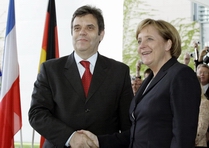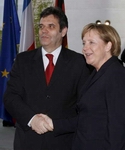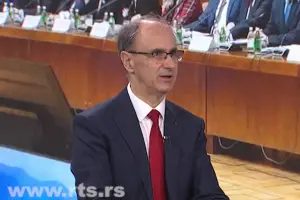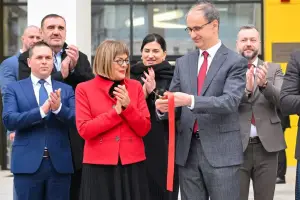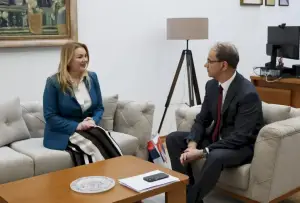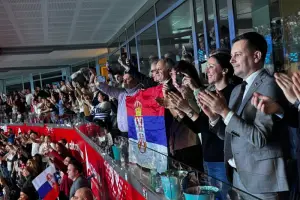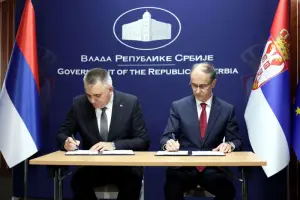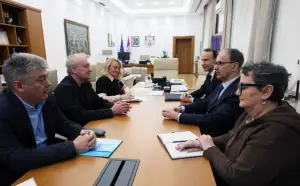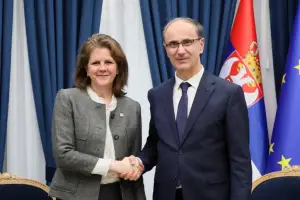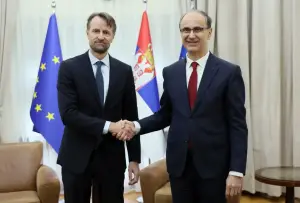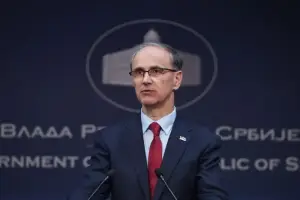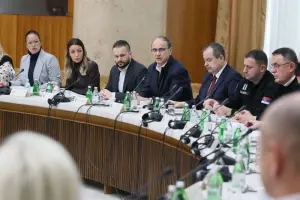Q:
A:
Solution to Kosovo-Metohija must be found in a compromising and European way
Belgrade/Berlin,
15 May 2006
Serbian Prime Minister Vojislav Kostunica met today with German Chancellor Angela Merkel in Berlin, where they discussed finding a solution to the Kosovo-Metohija problem, the referendum in Montenegro, negotiations on the Stabilisation and Association Agreement (SAA), cooperation with the Hague tribunal and economic cooperation between the two countries.
Kostunica told journalists after the meeting that he told the German Chancellor that the solution to the Kosovo problem should be sought in accordance with the principles of international law and the principles set by the Contact Group.
Kostunica told Merkel that the solution to the Kosovo problem must be found through compromise and in a European way and added that this solution should be sought between the autonomy that Kosovo had until 1999 and independence, which is essential autonomy.
Kostunica opposed the changing of borders and said that any “take it or leave it” solution, which makes one side a winner and the other side a loser, is not good.
The Serbian Prime Minister said that Chancellor Merkel had much understanding for the complex Kosovo issue and pointed out that terms such as limited sovereignty or conditional independence were not mentioned in the meeting although they could be heard in the European public.
Kostunica pointed to ways of solving similar problems in other countries, including Bosnia-Herzegovina, where this process started with the Dayton Accords ten years ago and is still underway.
According to him, one of the topics discussed with Chancellor Merkel was the Montenegrin referendum. Kostunica repeated Serbia’s devotion to the state union with Montenegro, support of integration and opposition to disintegration. The Serbian Prime Minister expressed satisfaction because the EU is involved in the referendum affairs in Montenegro.
The two officials also discussed boundaries for continuation of the talks on SAA as well as the problem with The Hague. Kostunica said that he wishes to end this issue so that SAA negotiations may continue, adding that there is political will but there are technical problems in realisation of this national and state interest.
Drawing a parallel with Croatia, where, as he said, the issue of Ante Gotovina also was not solved overnight, Kostunica said that the case of Ratko Mladic is even more complex and complicated.
When it comes to cooperation with the Hague, no deadlines were mentioned during the meeting with Merkel, he added.
I have committed myself to deadlines only once, and that was during the talk with the Tribunal's chief prosecutor Carla Del Ponte a year ago, when I said that the Hague issue should have already been solved, state Kostunica.
He stressed that prior to meeting Merkel he had also talked with the president and members of the German parliament's Foreign Affairs Department, and added that sooner or later, the European perspective will lie in the future of the Balkans.
Kostunica said he is satisfied that in Berlin he had collocutors who showed considerable understanding for what he had to say.
When your collocutors really want to hear your problems rather than simply give short shrift to them, then you have reasons for optimism, concluded Kostunica.
He signed the guest book at the Konrad Adenauer Foundation, where he delivered a lecture themed "Serbia on the Road to EU".
Kostunica, who is on a two-day working visit to Germany, will talk tomorrow with German Federal Minister of Foreign Affairs Frank-Walter Steinmeier.
Afterwards, he will travel to Dusseldorf to talk with Minister-President of the German state of North Rhine-Westphalia Jurgen Ruttgers and the state's Minister of Economy, SMEs and Energy Christa Thoben.
During his stay in Dusseldorf, Kostunica will meet with leading German businesspeople in Deutsche Bank to discuss investment possibilities in Serbia.
Serbian Minister of International Economic Relations Milan Parivodic, Minister of Economy Predrag Bubalo and Minister of Capital Investment Velimir Ilic are also in the Serbian government’s delegation.
Kostunica told Merkel that the solution to the Kosovo problem must be found through compromise and in a European way and added that this solution should be sought between the autonomy that Kosovo had until 1999 and independence, which is essential autonomy.
Kostunica opposed the changing of borders and said that any “take it or leave it” solution, which makes one side a winner and the other side a loser, is not good.
The Serbian Prime Minister said that Chancellor Merkel had much understanding for the complex Kosovo issue and pointed out that terms such as limited sovereignty or conditional independence were not mentioned in the meeting although they could be heard in the European public.
Kostunica pointed to ways of solving similar problems in other countries, including Bosnia-Herzegovina, where this process started with the Dayton Accords ten years ago and is still underway.
According to him, one of the topics discussed with Chancellor Merkel was the Montenegrin referendum. Kostunica repeated Serbia’s devotion to the state union with Montenegro, support of integration and opposition to disintegration. The Serbian Prime Minister expressed satisfaction because the EU is involved in the referendum affairs in Montenegro.
The two officials also discussed boundaries for continuation of the talks on SAA as well as the problem with The Hague. Kostunica said that he wishes to end this issue so that SAA negotiations may continue, adding that there is political will but there are technical problems in realisation of this national and state interest.
Drawing a parallel with Croatia, where, as he said, the issue of Ante Gotovina also was not solved overnight, Kostunica said that the case of Ratko Mladic is even more complex and complicated.
When it comes to cooperation with the Hague, no deadlines were mentioned during the meeting with Merkel, he added.
I have committed myself to deadlines only once, and that was during the talk with the Tribunal's chief prosecutor Carla Del Ponte a year ago, when I said that the Hague issue should have already been solved, state Kostunica.
He stressed that prior to meeting Merkel he had also talked with the president and members of the German parliament's Foreign Affairs Department, and added that sooner or later, the European perspective will lie in the future of the Balkans.
Kostunica said he is satisfied that in Berlin he had collocutors who showed considerable understanding for what he had to say.
When your collocutors really want to hear your problems rather than simply give short shrift to them, then you have reasons for optimism, concluded Kostunica.
He signed the guest book at the Konrad Adenauer Foundation, where he delivered a lecture themed "Serbia on the Road to EU".
Kostunica, who is on a two-day working visit to Germany, will talk tomorrow with German Federal Minister of Foreign Affairs Frank-Walter Steinmeier.
Afterwards, he will travel to Dusseldorf to talk with Minister-President of the German state of North Rhine-Westphalia Jurgen Ruttgers and the state's Minister of Economy, SMEs and Energy Christa Thoben.
During his stay in Dusseldorf, Kostunica will meet with leading German businesspeople in Deutsche Bank to discuss investment possibilities in Serbia.
Serbian Minister of International Economic Relations Milan Parivodic, Minister of Economy Predrag Bubalo and Minister of Capital Investment Velimir Ilic are also in the Serbian government’s delegation.

